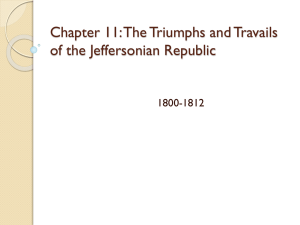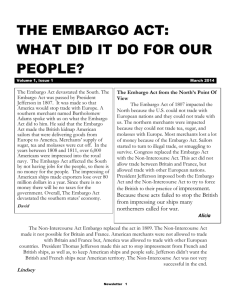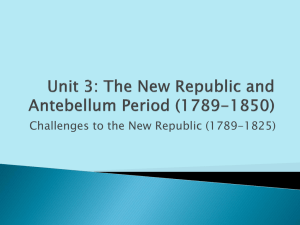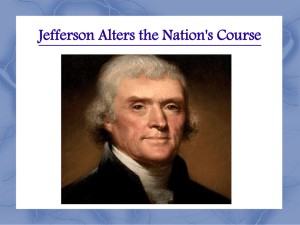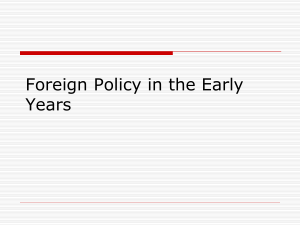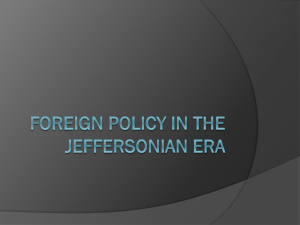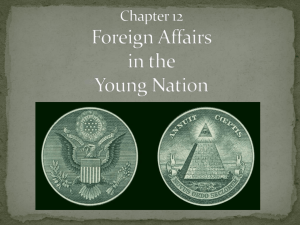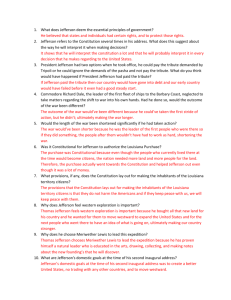The Early Republic A Time of Conflict: The Jefferson Era Part 2 In
advertisement
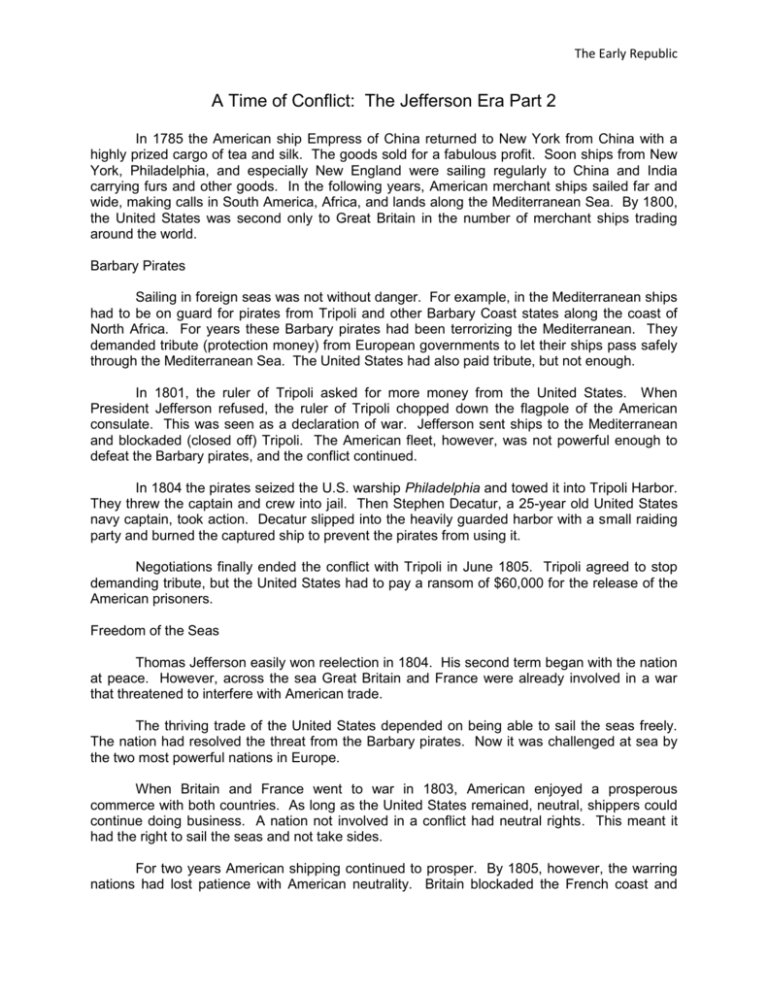
The Early Republic A Time of Conflict: The Jefferson Era Part 2 In 1785 the American ship Empress of China returned to New York from China with a highly prized cargo of tea and silk. The goods sold for a fabulous profit. Soon ships from New York, Philadelphia, and especially New England were sailing regularly to China and India carrying furs and other goods. In the following years, American merchant ships sailed far and wide, making calls in South America, Africa, and lands along the Mediterranean Sea. By 1800, the United States was second only to Great Britain in the number of merchant ships trading around the world. Barbary Pirates Sailing in foreign seas was not without danger. For example, in the Mediterranean ships had to be on guard for pirates from Tripoli and other Barbary Coast states along the coast of North Africa. For years these Barbary pirates had been terrorizing the Mediterranean. They demanded tribute (protection money) from European governments to let their ships pass safely through the Mediterranean Sea. The United States had also paid tribute, but not enough. In 1801, the ruler of Tripoli asked for more money from the United States. When President Jefferson refused, the ruler of Tripoli chopped down the flagpole of the American consulate. This was seen as a declaration of war. Jefferson sent ships to the Mediterranean and blockaded (closed off) Tripoli. The American fleet, however, was not powerful enough to defeat the Barbary pirates, and the conflict continued. In 1804 the pirates seized the U.S. warship Philadelphia and towed it into Tripoli Harbor. They threw the captain and crew into jail. Then Stephen Decatur, a 25-year old United States navy captain, took action. Decatur slipped into the heavily guarded harbor with a small raiding party and burned the captured ship to prevent the pirates from using it. Negotiations finally ended the conflict with Tripoli in June 1805. Tripoli agreed to stop demanding tribute, but the United States had to pay a ransom of $60,000 for the release of the American prisoners. Freedom of the Seas Thomas Jefferson easily won reelection in 1804. His second term began with the nation at peace. However, across the sea Great Britain and France were already involved in a war that threatened to interfere with American trade. The thriving trade of the United States depended on being able to sail the seas freely. The nation had resolved the threat from the Barbary pirates. Now it was challenged at sea by the two most powerful nations in Europe. When Britain and France went to war in 1803, American enjoyed a prosperous commerce with both countries. As long as the United States remained, neutral, shippers could continue doing business. A nation not involved in a conflict had neutral rights. This meant it had the right to sail the seas and not take sides. For two years American shipping continued to prosper. By 1805, however, the warring nations had lost patience with American neutrality. Britain blockaded the French coast and The Early Republic threatened to search all ships trading with France. France announced that it would search and seize ships caught trading with Britain. The British needed sailors for their naval war, but conditions in the British navy were terrible. Sailors were poorly paid, poorly fed, and badly treated. Many of them deserted. Desperately in need of sailors, the British often used force to get them. British naval patrols claimed the right to stop American ships at sea. They seized any sailors on board suspected of being deserters from the British navy and forced them into service. This practice was known as impressment, and it was a clear violation of neutral rights. While some of those taken were deserters from the British navy, the British also impressed thousands of native-born and naturalized American citizens. Quite often the British would lie in wait for American ships outside an American harbor. This happened in June 1807 off the coast of Virginia. A British warship stopped the American ship the Chesapeake and demanded to search the ship for British deserters. When the Chesapeake’s captain refused, the British opened fire on the ship. The British attacked killed three Americans, wounded 18, and crippled the American ship. As news of the attack spread, Americans reacted with an anti-British fury not seen since the Revolutionary War. President Jefferson’s Secretary of State James Madison called the attack an outrage. Many demanded war with Britain. However, President Jefferson tried a solution other than war. A Ban on Trade The British impressment of sailors had led Jefferson to ban some trade with Britain. However, the attack on the Chesapeake resulted in even stronger measures. In December 1807, the Republican Congress passed the Embargo Act. An embargo prohibits trade with another country. Although Great Britain was the target of this act, the embargo banned trade to all foreign countries. Jefferson wanted to prevent Americans from using other countries as go-betweens in the forbidden trade. By using the embargo, President Jefferson and Secretary of State Madison hoped to hurt Britain but avoid war. They believed the British depended on American agricultural products. As it turned out, the embargo of 1807 was a disaster. The measure wiped out all American commerce with other nations. Worse, the embargo was ineffective against Britain, because Britain simply traded with South America for its agricultural goods. Even worse, the embargo divided the American people. New England was the heart of the American shipping industry and the part of the country with the strongest support for the Federalist Party. New England and the Federalists complained the loudest about the embargo. With ships stuck in their ports, unemployment began to rise, and protests flooded Washington. New England was not the only region hurt by the embargo. In the South tobacco meant for Europe rotted on the docks, and cotton went unpicked. In the West the price of wheat declined, and river traffic came to a halt. At first, however, these Republican regions continued to support Jefferson. The Early Republic The embargo proved difficult to enforce. Before long American shippers began smuggling their goods, just as they had done in the days of the Revolutionary War. Public opinion started to turn against the president and the Republicans. Having suffered a disastrous setback in the 1804 election, the Federalists now gained support from the growing feelings against the embargo. Jefferson Leaves Office Thomas Jefferson followed Washington’s precedent and said that he would not be a candidate for a third term. With Jefferson’s approval the Republicans chose James Madison as their candidate for president. The Federalists nominated Charles Pinckney and hoped that anger over the embargo would gain support for their party. Pinckney won in most of the New England states, but the Federalist candidate got little support from the other regions of the country. James Madison won with 122 electoral votes to Pinckney’s 47 votes. The embargo clearly had not worked. On March 1, 1809, Congress repealed it. In its place Congress passed the much weaker Nonintercourse Act. This new act prohibited trade only with Britain and France and their colonial possessions. It was no more popular or successful than the Embargo Act. Meanwhile Britain continued to claim the right to halt American ships, and cries for war with Britain grew louder and louder. The Early Republic A Time of Conflict: The Jefferson Era Part 2 1. By 1800, the ____________________________ was second only to _______________ ___________________ in the number of _________________________________ traveling around the world. 2. Sailing in foreign seas was not without danger. In the ___________________________ __________ ships had to be on guard for __________________ from Tripoli and other _________________________ states along the coast of ________________________. What did pirates demand? 3. What happened when President Jefferson refused to pay more money? 4. How did Jefferson respond? 5. How did the conflict with Tripoli end? 6. The foreign trade of the United States depended on being able to __________________ ______________________________________. What threatened to interfere with American trade? The Early Republic 7. When Britain and France went to war in 1803, the United States remained ____________________. The United States said it had neutral rights. What did this mean? 8. Britain and France lost patience with American neutrality. What did the countries do? (a) Britain – (b) France – 9. What did British naval patrols do when they stopped American ships at sea. 10. What the British did was known as _________________________________, and it was a violation of ________________________________. 11. In December 1807, the Republican Congress passed the Embargo Act. With the act the embargo banned _____________________________________________________. (a) Why did Jefferson do this? (b) Why did Jefferson think this would hurt Britain? The Early Republic (c) How did the embargo affect Britain? 12. How did the embargo affect different parts of the country? (a) New England – (b) The South – (c) The West – 13. The embargo proved difficult to ________________________. Before long American shippers began _________________________________ their goods. 14. Jefferson followed Washington’s precedent and was not a ________________________ ______________________________________. Who became president after Thomas Jefferson? 15. In 1809, Congress replaced the Embargo Act with the Nonintercourse Act. What did this do?
